Contributed by dq82 - 2015/4/28 - 15:44
×
![]()
Note for non-Italian users: Sorry, though the interface of this website is translated into English, most commentaries and biographies are in Italian and/or in other languages like French, German, Spanish, Russian etc.

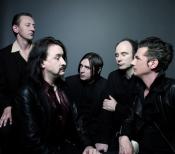
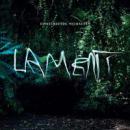
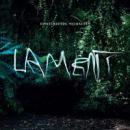
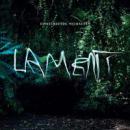



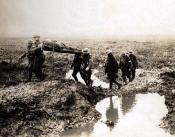
2014
Lament
In truth, the piece can only be fully realised, as well as best experienced, in its physical embodiment, performed on or by founding member Andrew Unruh’s gigantic instruments and noise generating devices that visually evoke the horrors the work describes or embeds in the sounds they conjure from the filth and terror of the industrialised 20th century world at war with itself.
But in fulfilling what at first appears to be a surprise commission for such a formidable longtime outsider group, Einstürzende Neubauten transformed the earthy, idiosyncratic contents they mined from academic, state, music hall and internet archives with the help of their two researchers into a richly complex cycle of original and cover songs and performance pieces.
The music often originated in LAMENT’s storytelling needs, be it in terms of sounds used or compositions structured along First World War flow charts or scored from calendars of the involvement of the 20 plus countries embroiled in it. The way LAMENT plays off pre-existing and composed materials, pieces clipped together from historical records next to direct cover interpretations, or indeed their Frankenstein like construction of an ur-anthem/national hymn delivers a differently angled history of the war.
Finally, LAMENT opens Bargeld’s case that the First World War never ended - the interwar and postwar periods being essentially pauses for breath as the great military powers carry on their conflict at some remove in faraway wars fought by proxy.
Kriegsmaschinerie - Hymnen - The Willy - Nicky Telegrams - In de loopgraf - Der 1. Weltkrieg (Percussion Version) - On Patrol in No Man's Land - Achterland - Lament - Lament - How did I die? - Sag Mir Wo Die Blumen Sind - Der Beginn des Weltkrieges 1914 (unter Zuhilfenahme eines Tierstimmenimitators) - All of No Man's Land Is Ours
L A M E N T
Written in three parts, the title track Lament is the project’s centrepiece. “I originally wanted to write a lament, in the sense of a Klagegesang,” explains Bargeld. “You know, the song blames this, and I do this, etc, etc, but that idea reduced more and more, until the track ended up with just this one sentence. Only two words are left at the end: Macht Krieg. Which mean: Power. War. But in German macht Krieg also means: make war.”
ABWÄRTSSPIRALE
Translating as Winding Down Spiral, the second part musically does exactly what it says, tumbling through a downwards spiral based on a pattern taken from the four numbers making up the final year of the war: 1-9-1-8.
PATER PECCAVI
The musical basis of the third part is a drastically slowed down version of a motet about the Prodigal Son called Pater Peccavi, composed by the 16th century renaissance composer Jacobus Clemens non Papa who lived most of his life in Diksmuide. Over the resulting drawn out drone, Neubauten members each ‘play’ the voices of prisoners of war, recorded during their incarceration in Germany on wax cylinder by German linguists, who asked them to recite the Biblical parable of The Prodigal Son in their own tongue. These amazing recordings were discovered by Neubauten’s researchers in Berlin’s Humboldt University. “And some of the languages on record are nowadays extinct,” says Bargeld. “Everything, from Occitanic to Corsican dialects, was recorded, and we played them through small speaker cubes. We treat them like eggs, open them, let them play on the microphone. We treat them like treasured eggs, fragile objects. Between us we play 36 or so voices taken from the wax cylinders.”
Elsewhere Bargeld told Danish TV viewers, “I was very, very careful to not use these recordings as sound effects, and not use these recordings as some kind of validation of authenticity. It had to be treated like eggs, like raw eggs. Like something that is very... they’re very carefully not to be interfered with. These are people long dead. These are people that had to speak this under pressure. They were in prison. So, there’s a certain amount of delicacy involved in composing something with these kind of ghost voices.”